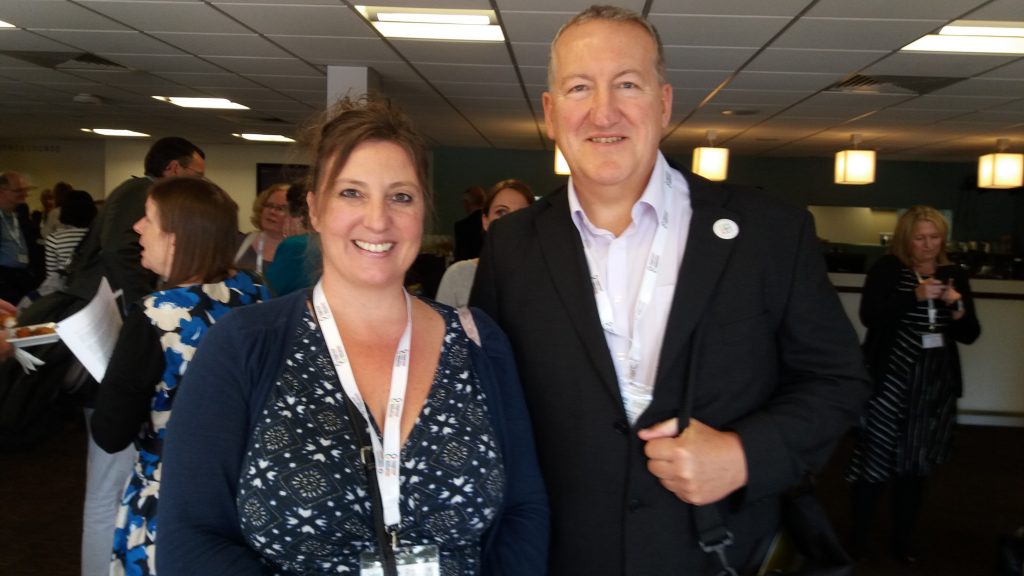
Well here we are in the middle a rare, warm summer week that waited until autumn to arrive… the like of which was absent from the recent school holidays. The consequences of these successive fine days- for some, it will be about forlorn glances to the outside from inside class rooms. For others, like myself it means reaching for the large ‘get on there’ brush and the fence paint. Then the next day bring out the ladder for high border trimming. A busy time, maximising the opportunities to complete all the much delayed ‘to dos.’ Well it is easier to exploit these rare meteorological opportunities when you are retired. Never mind normal drizzle service will no doubt soon return.
That more normal Neath weather will offer the time to pursue one of my ongoing passions, no not painting those mossy fences, that of being a public research partner at the Wales Cancer Research Centre (WCRC). I am one of seven members of the public who are so designated and I have been in this role since 2017. As a group we assist throughout the cancer research area giving a public perspective on research priorities and practicalities when it comes to the intersection with treatments. It is very ‘lay’ but that is what is required. I may not understand exactly (or any of) what happens down at the other end of the microscope but I know of the consequences for members of the public like myself.
Most are drawn to this public involvement activity by personal experience of cancer. In my case it was losing both parents to the disease, one at a relatively young age. Public involvement is a very wide constituency, and it co-exists with patient involvement too. The scope for contribution and commentary on disease and treatment areas ( beyond the microscope phase) is vast. It also goes from health and into social care. Also, worry not, it is not all complex; your views, opinions and comments are sought and necessary.
So what am I involved in, where do I get my say? Well I am interested in potential advances in treatment, particularly but by no means exclusively, in disease areas that have affected my family. That is why I am involved with QuicDNA, a lung cancer study which is being run being run by Dr Magda Meissner a Consultant Medical Oncologist. This area of study is going to be ‘of the future’ and it has been rightly up in lights for concept and patient story.
Talking about ‘lights,’ I get the camera and action phases from my long running trial management roles in the CONSCOP ( Bowel Cancer) studies, these are run by Professor Sunil Dolwani, Professor of Gastroenterology – Screening, Prevention and Early Detection of Cancer in Cardiff University School of Medicine. Little did I previously think that I would be around a table contributing fully to discussions on a research with such an array of renowned research talent. Well I am and I do.
I have been with the Conscop studies for a number of years. I have commented on CONSCOP 1 and now Conscop 2. The CONSCOP2 study investigates whether spraying a blue dye in the upper large bowel during a colonoscopy improves the camera led detection of flat polyps, which can be difficult to spot and may grow into cancer faster than typical polyps. The study is part of the UK Bowel Cancer Screening Programme, which has reduced bowel cancer deaths by 15%. To determine if dye spray improves detection, 2750 participants from 18 centres in England and Wales were randomly assigned to receive either a standard colonoscopy or one using the dye. Participants will be followed for three years through routinely collected NHS data.
The study closed to recruitment in February 2024. The central study team are now liaising with the local teams to request pathology slides from all polyps detected in the proximal colon. The slides are being sent to Cardiff & Vale NHS Trust where they will be scanned and returned to the local pathology departments. Consensus meetings are being arranged where they slides will be reviewed by an expert panel of at least three independent expert pathologists within the UK NHS. Data cleaning is currently underway in readiness for analysis.
For the public member of the TMG a vital link for meaningful inclusion is the Trial Manager and the staff. For both of the studies named above I have been lucky to work with Georgina Gardner of the Centre for Trials Research at Cardiff. She keeps me in the loop, as we say in these parts.
It has been a fascinating journey for myself to comment on these studies. Inputting commentary and views on the practicalities for patients who opt to be part of the study. Contributing to the information that they receive which plainly describes the study, the physical examination and the subsequent use of their data.
I do enjoy being a part of the progress in a disease area. Using the bowel cancer disease and Conscop study experience I have gone on to become the public voice on the Bowel Screening Wales Programme Board. That is a good example of where public involvement can advance to, but there are many important opportunities to contribute to research which are at all other levels as regards complexity and demands of your time. There really can be something for everyone! To find out how you can get involved, please sign up to the Health and Care Research Wales weekly bulletin which lists regular opportunities.
Bob McAlister, PPI Research Partner for the Wales Cancer Research Centre